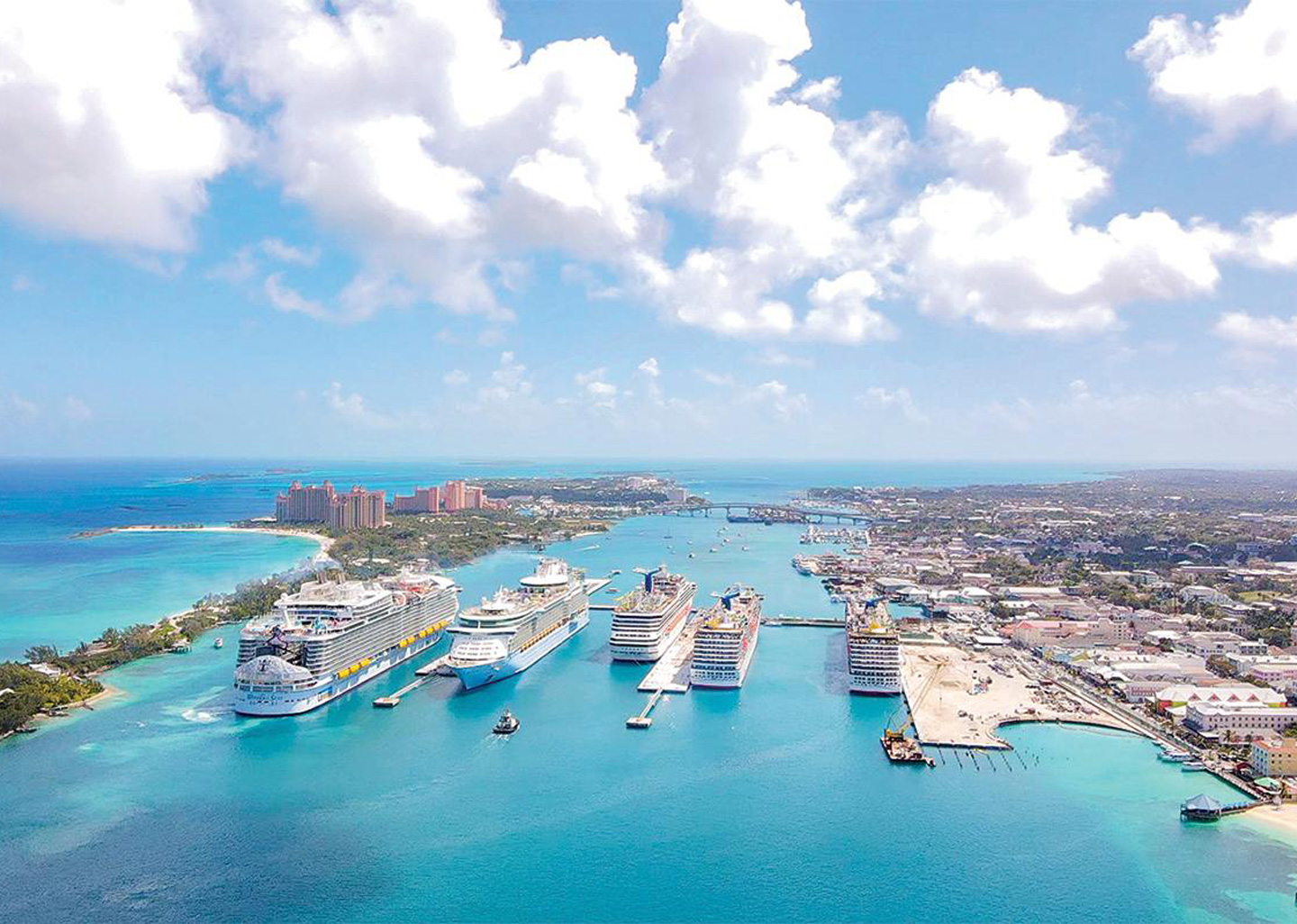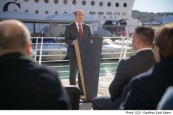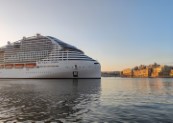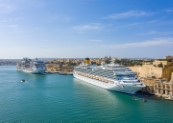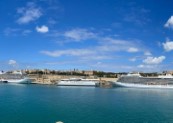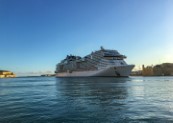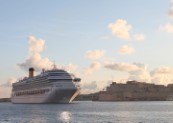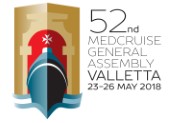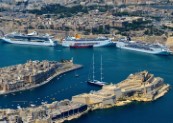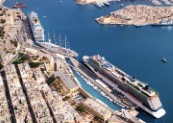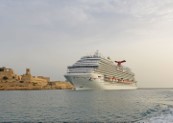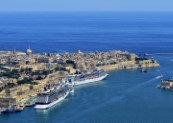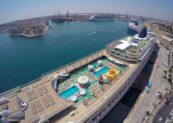Critical role companies like Global Ports play in providing all the essential infrastructure for cruise liners
February 14, 2023 | Josef Cutajar
GPH Malta Finance plc recently published a prospectus following regulatory approval for the admissibility to listing on the official list of the Malta Stock Exchange of up to €25 million 6.25% unsecured and guaranteed bonds maturing in 2030.
GPH Malta is the finance arm of Global Ports Holding plc (the guarantor), which in turn is the world’s largest independent cruise port operator with a market share of 12 per cent serving cruise lines, ferries, yachts and mega-yachts.
Global Ports is listed on the main market of the London Stock Exchange and is indirectly majority-owned by the Turkish conglomerate Global Investment Holding, which is involved in infrastructure, energy generation, non-piped natural gas sales and distribution, mining, real estate, as well as brokerage and asset management.
Although this is the first time that Global Ports is tapping the local corporate bond market, and therefore some investors might not be acquainted with the group’s business model and track record, on the other hand, people would surely be familiar with the sector and the local operations of the Valletta Cruise Port. This is because of the huge popularity of cruise tourism in general and the critical role that companies like Global Ports play in providing all the essential infrastructure for cruise liners (such as Carnival, MSC Cruises, Norwegian Cruise Line and Royal Caribbean) to operate.
Since its early days in 2004, Global Ports built a solid portfolio of cruise ports predominantly in the Mediterranean region where the group is today an undisputed leader, with numerous operations stretching from Turkey to Spain and the Canary Islands.
Further afield, Global Ports is also present in Denmark, Singapore and Vietnam, while in the Caribbean the group has control for a period of at least 25 years over the operations of the Nassau Cruise Port in the Bahamas, which is in close proximity to Miami (often referred to as the ‘cruise capital of the world’) – by far the most valuable asset of the group with a carrying value of just under $235 million as at March 31, 2022.
Also in the Caribbean, in 2019 Global Ports took over the operations of Antigua Cruise Port for a period of 30 years, while in mid-August 2022, the group signed yet another 30-year multimillion concession for San Juan Cruise Port, which is located in Puerto Rico. Once this agreement is finalised in the coming months, San Juan Cruise Port will become the group’s third largest asset after Barcelona as Global Ports is committed to significantly upgrade, modernise and expand the port’s capacity for handling the world’s largest and most luxurious cruise ships.
A remarkable aspect of the group’s strategy adopted during the COVID-19 pandemic was the extent to which it took advantage of the unique opportunities created at the time in the market to aggressively expand its portfolio of cruise ports to 26 compared to 16 in 2019. This rapid growth not only resulted in a stronger and more geographically diversified profile but is also expected to result in improved returns and economies of scale going forward.
In fact, revenues during the first six months of the current financial year ending March 31, 2023, surged to over $64 million compared to almost $15 million in the previous comparable period, reflecting the robust recovery in demand for holidaymaking, as well as the considerable increase in the number of cruise ports within the group’s portfolio.
Moreover, during the same period, Global Ports recorded an EBITDA of over $40 million (compared to a negative EBITDA of $0.49 million in H1 2021/22), most of which filtered into cash flows supporting the group’s ambitious investments programme.
Although these results are truly encouraging when compared to the massive after-tax losses amounting to nearly $140 million that Global Ports incurred between January 2020 and March 2022 due to the imposed lockdowns, the considerable negative effects of the COVID-19 pandemic are still visible today.
In fact, as total equity contracted markedly to $26.3 million as at September 30, 2022, compared to $155.3 million as at the end of 2019, coupled with the increase in borrowings fuelling the group’s aggressive expansion, the proportion of debt to capital climbed to over 90 per cent.
However, it is important to highlight that from a net debt-to-EBITDA multiple perspective (which is the more appropriate metric to consider when analysing the creditworthiness of a company with high upfront capital expenditure requirements like Global Ports) the projected EBITDA of more than $100 million to be generated in the 2023/24 financial year is estimated to translate to less than seven times the amount of net debt (2019: 11.2 times).
This means that it would take less than seven years for the group to repay its net debt (including lease and other financial liabilities) from its proxy cash earnings which essentially matches the term of the new bonds.
Meanwhile, the target EBITDA of more than $100 million for the 2023/24 financial year should be highly achievable given the actual bookings from cruise lines for the next two years, the strong dynamics of the current recovery in tourism (as also evidenced by the recent forecasts provided by Malta International Airport plc), as well as the predictable and very long-term nature of the group’s revenue streams.
The latter are the backbone behind the undertaking that is being made by Global Ports to build a ‘sinking fund’ equivalent to 50 per cent of the nominal value of the bonds by March 2030 which should also provide additional support for a healthy secondary market trading activity in the bonds’ post listing.
One of the main criticisms by investors towards the local capital market over the years has been the high element of concentration risks towards the Maltese economy in general and the elevated exposure towards some of the largest segments like tourism, property and financial services.
In this respect, the addition of a new international name and standing such as Global Ports is surely a welcome development in line with the roadmap enacted by the Malta Stock Exchange some years back for a more vibrant and successful local capital market.
Josef Cutajar is a financial analyst at MZ Investment Services Limited (MZI). The author has obtained the information contained in this article from sources believed to be reliable and has not verified independently the information contained herein.
The contents of the article are the author’s views and may not reflect other opinions in the organisation. The article is being published solely for information purposes and should not be construed as investment, legal or tax advice, or as a recommendation to buy, sell or hold any security, investment strategy or market sector.
The financial instrument referred to in this article may not be suitable or appropriate for every investor.
Prospective investors are urged to consult their investment adviser prior to making an investment. Past performance is no guarantee of future results, and the value of investments may go down as well as up.
MZI accepts no responsibility or liability whatsoever for any expense, loss or damages arising out of, or in any way connected with, the use of all or any part of this article.
No part of this article may be shared, reproduced or distributed at any time without the prior consent of MZI. MZI is acting as sponsor to GPH Malta Finance plc.
MZI is a member of the Malta Stock Exchange and is licensed by the Malta Financial Services Authority to conduct investment services business (License N° IS23936).
Additional information can be made available upon request from MZ Investment Services Limited, 61 MZ House, St Rita Street, Rabat RBT 1523. Telephone: +356 21453739; e-mail: info@mzinvestments.com; website: www.mzinvestments.com.
Source: Times of Malta



